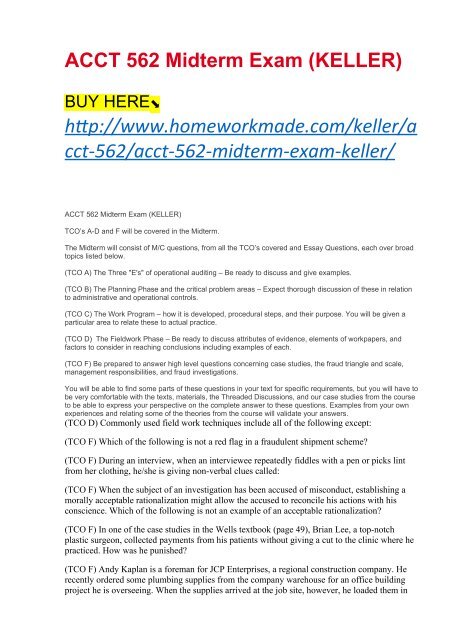ACCT 562 Midterm Exam (KELLER)
Create successful ePaper yourself
Turn your PDF publications into a flip-book with our unique Google optimized e-Paper software.
<strong>ACCT</strong> <strong>562</strong> <strong>Midterm</strong> <strong>Exam</strong> (<strong>KELLER</strong>)<br />
BUY HERE⬊<br />
htp://www.homeworkmade.com/keller/a<br />
cct-<strong>562</strong>/acct-<strong>562</strong>-midterm-exam-keller/<br />
<strong>ACCT</strong> <strong>562</strong> <strong>Midterm</strong> <strong>Exam</strong> (<strong>KELLER</strong>)<br />
TCO’s A-D and F will be covered in the <strong>Midterm</strong>.<br />
The <strong>Midterm</strong> will consist of M/C questions, from all the TCO’s covered and Essay Questions, each over broad<br />
topics listed below.<br />
(TCO A) The Three "E's" of operational auditing – Be ready to discuss and give examples.<br />
(TCO B) The Planning Phase and the critical problem areas – Expect thorough discussion of these in relation<br />
to administrative and operational controls.<br />
(TCO C) The Work Program – how it is developed, procedural steps, and their purpose. You will be given a<br />
particular area to relate these to actual practice.<br />
(TCO D) The Fieldwork Phase – Be ready to discuss attributes of evidence, elements of workpapers, and<br />
factors to consider in reaching conclusions including examples of each.<br />
(TCO F) Be prepared to answer high level questions concerning case studies, the fraud triangle and scale,<br />
management responsibilities, and fraud investigations.<br />
You will be able to find some parts of these questions in your text for specific requirements, but you will have to<br />
be very comfortable with the texts, materials, the Threaded Discussions, and our case studies from the course<br />
to be able to express your perspective on the complete answer to these questions. <strong>Exam</strong>ples from your own<br />
experiences and relating some of the theories from the course will validate your answers.<br />
(TCO D) Commonly used field work techniques include all of the following except:<br />
(TCO F) Which of the following is not a red flag in a fraudulent shipment scheme?<br />
(TCO F) During an interview, when an interviewee repeatedly fiddles with a pen or picks lint<br />
from her clothing, he/she is giving non-verbal clues called:<br />
(TCO F) When the subject of an investigation has been accused of misconduct, establishing a<br />
morally acceptable rationalization might allow the accused to reconcile his actions with his<br />
conscience. Which of the following is not an example of an acceptable rationalization?<br />
(TCO F) In one of the case studies in the Wells textbook (page 49), Brian Lee, a top-notch<br />
plastic surgeon, collected payments from his patients without giving a cut to the clinic where he<br />
practiced. How was he punished?<br />
(TCO F) Andy Kaplan is a foreman for JCP Enterprises, a regional construction company. He<br />
recently ordered some plumbing supplies from the company warehouse for an office building<br />
project he is overseeing. When the supplies arrived at the job site, however, he loaded them in
his truck and took them home to use in remodeling his master bathroom. What kind of inventory<br />
theft scheme did Andy commit?<br />
(TCO F) According to the 2009 Global Fraud Survey, the theft of which type of non-cash asset<br />
was the least common but caused the highest median loss?<br />
(TCO F) In an interview situation, the process of observing behavior before critical questions are<br />
asked is called:<br />
(TCO A) Benefits derived from operational reviews include<br />
(TCO B) Financial analysis using common-size balance sheet and income statements are used in<br />
the _____ phase to identify audit opportunities.<br />
(TCO A-D) Reviewing high level processes, interviewing, understanding the business is part of<br />
the _____ phase.<br />
(TCO A) Operational areas eligible for review include:<br />
(TCO F) Richard Moore is the controller for Ajax Company. Recently, he has suffered several<br />
large losses at the race track, causing him to incur enormous personal debts. Which type of nonsharable<br />
financial problem best describes Richard’s situation?<br />
(TCO F) Albrecht's Fraud Scale differs from Cressey’s Fraud Triangle by utilizing the factor of<br />
_____.<br />
(TCO F) Which of the following is not part of the fraud theory approach?<br />
(TCO F) The technique for analyzing the percentage change in individual financial statement<br />
items from one accounting period to the next is known as:<br />
(TCO F) In the Fraud Tree, asset misappropriations are broken down into cash and non-cash<br />
schemes. Which of the following is not considered a misappropriation of cash?<br />
(TCO A) _____ and converting cash allow a business to survive.<br />
(TCO F) The most important factor in preventing cash larceny from the deposit is:<br />
(TCO F) Dorothy McNally stole $232 from the company deposit while on the way to the bank.<br />
She can conceal the theft by recording the missing amount on the bank reconciliation as a(n):<br />
(TCO F) According to a study by COSO, which of the following groups is the most likely to<br />
commit financial statement fraud?<br />
(TCO B) One of the primary purposes of the planning is to:<br />
(TCO A) Operational review procedures embrace the concept of conducting operations for<br />
economy, efficiency, and effectiveness. Provide a brief description of the ECONOMY aspect,<br />
and provide an example.<br />
(TCO F) The operational reviewer typically has multiple personal attributes that make them and<br />
mold them into an operational reviewer. List and describe at least three, and tell why they are<br />
positive attributes for the operational reviewer.<br />
(TCO F) Albrecht, in his research, developed the “fraud scale” and furnished a list of the reasons<br />
employees and executives commit occupational fraud. How are Albrecht’s conclusions similar to
Cressey’s? How are they different?<br />
(TCO F) Liability/expense omission is the preferred and easiest method of concealing<br />
liabilities/expenses. Why? Discuss how to detect this type of fraud.


















